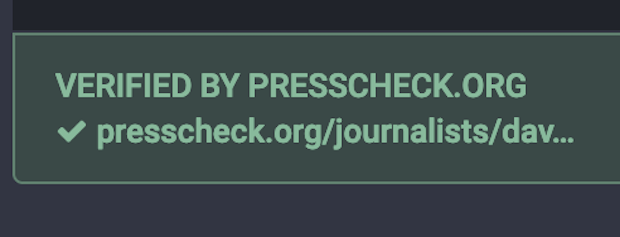
As Elon Musk's take on the Twitter verification scheme went horribly wrong, many journalists wondered what to do about their social media profiles. Those who managed to work their way around Mastodon faced another important challenge - how do you prove that you are a legitimate journalist on an open-source platform?
Unlike Twitter, Mastodon does not have a verification team to check whether journalists on the platform are who they say they are.
Read more: Eight Twitter alternatives for journalists
Two journalists, Dave Lee at the Financial Times and John Goodwin at CBS News, decided to take the matter into their own hands. The duo created a Mastodon verification tool PressCheck.org that allows journalists to verify their press credentials on the platform. All journalists are eligible - the site "is about confirming someone is who they say they are, not defining what a 'journalist' is."

"Elon Musk and his fans on Twitter seem to think the 'blue tick' is about a desperate need for status, when really it’s a case of simply being sure people are who they say there are," Lee told Journalism.co.uk via email.
"That matters especially when it comes to journalists. I don’t know if Mastodon will be a long-term replacement for Twitter, but it seemed vital that, as people started to join in larger numbers, there was a way to build trust around the media's presence. PressCheck is a relatively simple effort to solve that need."
How it works
The quickest way for journalists to get their Mastodon account verified is to tweet it from a verified Twitter account. The same goes for a verified LinkedIn account or any other platform that already has a solid verification process in place. According to Lee, verification of these accounts takes less than one minute.
If you do not have a verified social media account, you need to submit a request from your work email that will then be verified. You can submit it here.
PressCheck.org is a personal project and Lee does not know yet how he will sustain it in the long run, alongside his full-time journalist job on a demanding beat.
"If Mastodon cements itself as an important system for journalists and news, there will be a point where the site will need more formal support and funding. We're considering what that might look like and would welcome any approaches or suggestions on the shape of what comes next," he says.
"One of the most enjoyable things about this project has been seeing the sheer diversity of those who have applied. The list of beats speaks to that — it really is a broad spread of highly important coverage. In that spirit, we'd love our verification team to reflect the diversity of the platform, so we’d absolutely welcome any offers to volunteer with the verification process."
Join the Journalism.co.uk news channel on Telegram to receive news and updates straight to your phone every week
Free daily newsletter
If you like our news and feature articles, you can sign up to receive our free daily (Mon-Fri) email newsletter (mobile friendly).









